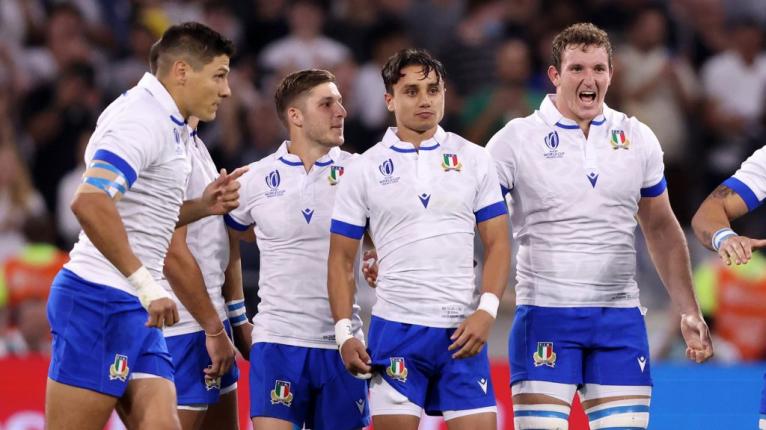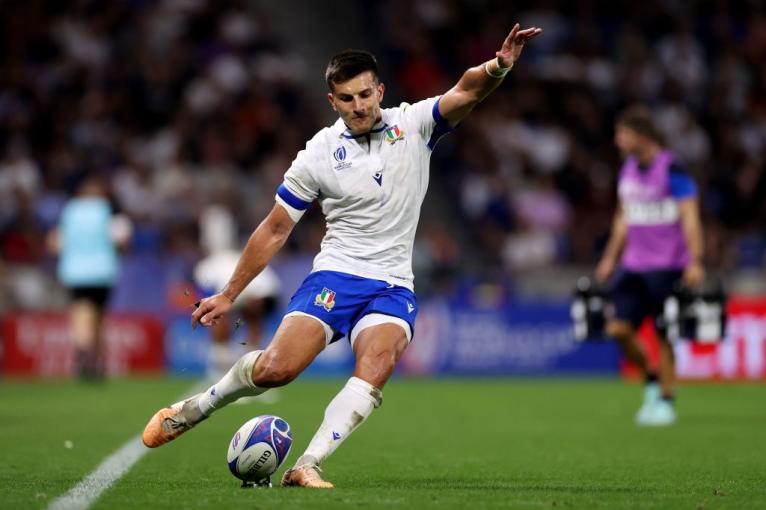A common narrative has run through all six camps in the build up to the Six Nations. Nuances and national differences aside, it seems every team, regardless of their ambitions, has a point to prove.
Ireland and France, who kick off the tournament with the World-Cup-final-that-never-was, are out to underline their pedigree as challengers to the Springboks and All Blacks. Wales and England are eager to return to lofty heights of old while Scotland, in possession of one of the most blistering backlines around, will take aim at their best ever shot at a title.
One team, though, has an even greater score to settle. Despite the need to address the southern hemisphere’s hold on the World Cup, and despite the slights and insecurities emanating from Gaul and the British Isles, there is no team which carries a monkey as large as the one on Italian shoulders.

The Azzurri – the lowest ranked Tier One Test side at 11th on World Rugby’s chart – have won just 13 of 120 Six Nations matches since 2000. Last season they registered their 13th winless campaign and have collected the wooden spoon in each of the past eight years. This may be a new dawn for the tournament, with a spate of fresh captains at the turn of a new cycle, but the same old questions surround a team which simply has to start pulling its weight.
“We know the questions won’t go away until we deliver,” says Tommaso Allan, Italy’s versatile playmaker who is as comfortable at fly-half or full-back. “But I’m not interested in answering those questions anymore. They don’t bother me. People need to sell articles and newspapers so they ask those questions. I just brush them aside now.”
New Zealand had a clear strategy to slow down our rucks and put pressure on us. We couldn’t deal with it. Our discipline wasn’t good and we were terrible at the rucks.
Still, they’re worth asking. Questions such as, are Italy capable of winning more than one match in the tournament – something they’ve achieved just twice from 24 attempts? Do they have a pack which can stand up to the heavyweights on the continent? Can they transfer the promise of their youth programme into the senior side? What impact will a new coach have on a stuttering union?
Even if Allan was so inclined to answer, not even Italy’s most-capped squad member with 79 appearances owns a crystal ball. Instead, he has to trust the new broom held by Gonzalo Quesada can sweep clean the ineptitude and substandard performances which have dogged the side across multiple generations.
“He’s a very detailed coach and a really correct person,” Allan says of Quesada, France’s assistant coach from 2008 to 2011, and a man previously in charge at French clubs Racing 92, Stade Francais and Biarritz, as well as Jaguares in his native Argentina. “We’ve got great clarity before every training session.
“He’s looked to improve our exit and our defence. We’ve recognised the need to improve our kicking out of hand. We’ve shown we’re dangerous with the ball but we maybe became a bit predictable at times. Yes, we have all these exciting players who can hurt teams from anywhere on the pitch, but it doesn’t help if the opposition knows what’s coming. I think we’d become a little too one dimensional.”
Allan references the final two matches of last year’s World Cup to prove his point. Italy were always going to struggle to progress from their group having been placed alongside New Zealand and France. But with improvements under Kieran Crowley, and with Paolo Garbisi at 10, Ange Capuozzo in the wide channels and Allan providing stability from full-back, there was hope they could at least bloody the nose of a giant.

It wasn’t to be. Their forwards were blown away by the All Blacks as they haemorrhaged 14 tries in in a 96-17 trouncing in Lyon. A week later they suffered their biggest ever defeat to the French, going down 60-7 while conceding eight tries.
“It was so frustrating,” Allan says. “We all went into the World Cup expecting to do a lot better. But then we came up against New Zealand and they rolled us. They had a clear strategy to slow down our rucks and put pressure on us. We couldn’t deal with it. Our discipline wasn’t good and we were terrible at the rucks. For a team that wants to attack it meant we couldn’t function.
“We were demoralised going into the France game and they did what New Zealand did. Our confidence was so low. We can take a lot of learnings. We’re determined to bounce back stronger and not make the same mistakes again.”
Despite the team’s struggles, Allan reflects positively on his own performances in France, especially from the kicking tee where he made all 16 of his attempts at goal. A conversion in the second half against New Zealand took him past Diego Dominguez as his country’s leading World Cup points scorer.
The press are brutal. Absolutely brutal. I don’t envy the English players whatsoever.
“I was proud of that and I feel it’s worth celebrating the good things that happen,” Allan says of his 101 points across three World Cups. “I never thought I’d play a single match in a World Cup so to be my country’s highest ever scorer is something special.
“Of course rugby is a team sport, but if every individual stands up we’ll be okay. If you only focus on the negatives life would be pretty bleak. I’ve taken that confidence into the new year.”
He’s back at Perpignan – the club where he started his senior career back in 2013 – after three seasons with Harlequins in southwest London. Though he says the decision to leave the Premiership was “an easy one”, and that he feels “at home” tucked between the Pyrenees and the Mediterranean, he admits an immovable object more or less forced his hand.
“With Marcus [Smith] playing the way he’s been playing, it was going to be hard to get a lot of game time at 10,” Allan says, describing England’s dazzling fly-half as, “incredible, one of the few players in our game with genuine x-factor.”
Our conversation turns to English playmakers and the way they’re perceived. Not by fans or foreign opponents, but by the English press. Allan is more than happy to answer these questions.

“They’re brutal. Absolutely brutal. I don’t envy the English players whatsoever. Playing for England, one of the world’s biggest teams, you’re naturally going to attract attention. But the press are out to sell papers and drive clicks and it seems negativity does that more than positivity. It’s so tough for the players. The abuse they get is horrible. I’ve seen it impact them.
“In Italy you get a few keyboard warriors online but they’re easy to ignore. The press don’t hammer us. They save that for the footballers. Even in France it’s not so bad. I understand in South Africa and New Zealand they can be a bit rough. But that seems like it comes from a good place because the sport is like a religion there. In England it’s nasty. Some of the headlines are staggering.”
This is why Allan has sympathy for Owen Farrell and believes his decision to take a break from Test rugby was “a smart decision”. Now a father and a veteran in the side at 30 years old, Allan says he is able to see rugby for what it is. “It’s a game,” he explains. “It’s meant to be enjoyed. If you’re not enjoying it then something has to change.”
Of course it’s also so much more than just a pastime for a man who conveys a burning desire to steer Italian rugby to previously unreachable heights. The game runs in his blood. His uncle, John Allan, played nine Tests at hooker for Scotland and another 13 for South Africa in the 1990s. His father, Willem, was also a handy hooker from Scotland but it was his mother, Paola Berlato, the first captain of Italy’s women’s team, who left the greatest impression.
I’ve got pictures of me holding a rugby ball before I could walk. There’s a photo of Joel Stransky holding me as a newborn.
“It was always going to be Italy,” says Allan, who represented Scotland at age group levels and also played for the Western Province academy team in South Africa. “I was born there. It’s my first language. I feel Italian more than anything else.
“And it was always going to be rugby. Maybe there were a few years when I was 10 or 12 when I didn’t know what I wanted to do. But I’ve got pictures of me holding a rugby ball before I could walk. There’s a photo of Joel Stransky [the former Springboks fly-half] holding me as a newborn. My dad and uncle are friends with him.
“Rugby has always been part of my life. If I can leave a mark on Italian rugby, if I can help improve Italian rugby, wow man, that would be incredible. I’d do anything to make that happen.”
There may be some questions Allan doesn’t want to address publicly. But that doesn’t mean he’s not trying to answer them.


Comments
Join free and tell us what you really think!
Sign up for free